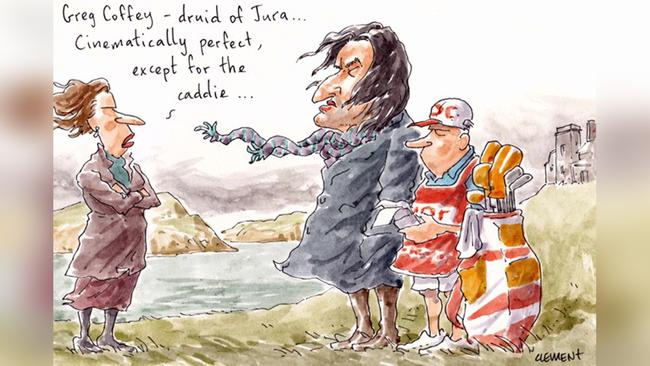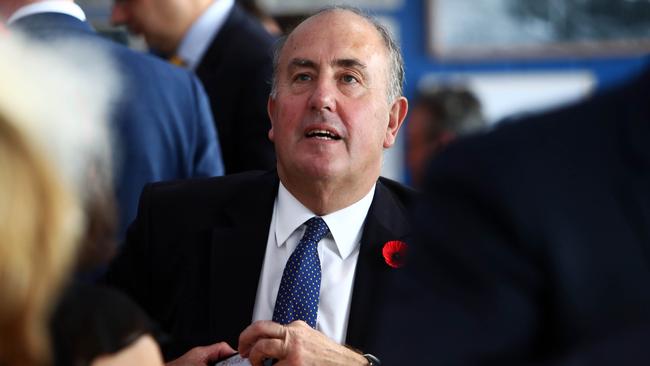Greg Coffey to share his Scotland golf course luxury

Expatriate funds manager Greg Coffey will soon be taking paying guests as he opens perhaps the world’s most luxurious golfing hotel on his remote Hebridean island in Scotland.
Ardfin Estate, on Jura, was bought for £3.5m in 2010 with the locals estimating £50m ($97m) has since been spent renovating Jura House and farm buildings into luxury accommodation, along with £20m creating an 18-hole golf course.
Set on Jura’s rugged melancholic terrain, expect to play the round among frolicking deer — that is, those that aren’t trophy head pieces around the walls of the billiards room, and even above the master suite bath.
The 18-hole private golf course was designed for Coffey by Bob Harrison, who designed the Ellerston, Hunter Valley course for the late Kerry Packer.
Being one of Scotland’s last wildernesses, the golf course contractors, who’ve built for hotelier Donald Trump, described it as the most logistically challenging course ever built in the UK.
Ardfin’s first paying guests from next month will need to pay £20,000 a night.
The big house on the 4900ha estate has been decked out in historic Scottish country house style by London-based interior designer Louise Jones, who has transformed homes from London to Abu Dhabi.
All a stark contrast to nearby stoic Barnhill, the basic farmhouse where George Orwell once stayed and is credited as writing his dystopian bestseller 1984. Jura, which Orwell sought out for its remoteness in the late 1940s, is only rarely open to tourists.
One local said the Ardfin house was stunning, and you would be forgiven for thinking a family had lived there for 600 years.
Not a hint of Australiana from Coffey, whose folks live at Lansvale in southwest Sydney.
Almost half the island’s population of 190 helped complete the project by Coffey, who has long been nicknamed the Wizard of Oz, after making a reputed £430m as a very young city hedge fund trader.
He is thriving in his hedge funds comeback following his brief 2012 retirement at 41.
Last year the fund of the whiz kid returned 28 per cent, easily beating the typical 6 per cent industry return, according to the Hedge Fund Research Index.
Over his near two decades, Coffey regularly made headlines with annualised 17 per cent returns, until his surprise retirement to spend more time with wife Ania and their children.
Coffey had spent a couple of years in the early 1990s at Macquarie Bank, having been a Macquarie University finance graduate
Coffey, who bought the Ardfin estate off the west coast of Scotland from the John Smith brewery family, retains a Balmoral Beach compound, plus a Whale Beach retreat.
Buying in to AMP
AMP shares have lost 20 per cent over the past two weeks, falling from $2.06 to $1.63.
So what does former treasury secretary and bubble prophet John Fraser do? Spend $19,165 buying up 11,580 shares at between $1.64 and $1.67 earlier this week.
He’s pretty much lifted his stake by 50 per cent.

It was late 2018 when AMP chairman David Murray appointed Fraser to its board shortly after Fraser had retired as secretary to the Australian Treasury. He once served as chairman and CEO of UBS for more than a decade in London.
And Fraser isn’t the only public servant to boost his AMP holding. Peter Varghese, the former secretary of the Department of Foreign Affairs and Trade and now the chancellor of the University of Queensland, has taken 30,000 shares at $1.68 apiece, a total outlay of $50,400.
He now holds 110,000 shares at the financial services company.
The trades come a few days after new non-executive director Michael Sammells bought 30,000 shares.
Fellow non-executive Andrea Slattery, who joined the board a year ago, bought 27,000 shares at $1.80 each at the start of the month.
Seven’s Games sweat
The International Olympic Committee is putting on a brave face, but COVID-19 means billionaire Kerry Stokes’s 2020 marquee broadcast of the Tokyo Games is in doubt.
That’s bad news for the Seven West Media chair and proprietor, whose Seven Network could be left without a new financial year programming launch pad for its free-to-air television.
Not even prodigal CEO turned consultant David Leckie, 68, could help with that as he works from home assisting latter-day Seven West boss James Warburton with programming decisions.
Yesterday, Seven’s market value was down to a bit over $233m, which compares with the group’s $570m in net debt at the end of the first half. Yikes!
Warburton, with some help from his friends at investment bank Morgan Stanley, is working to flog non-core assets so he can pay down some of that debt, with Seven’s $750m bilateral debt facility set to be refinanced, we hear, at the end of the next calendar year.
The debt facility is governed by several financial ratios, including one that measures its net debt relative to top-line earnings, or EBITDA (basically what the company makes before it pays interest, tax and accounts for depreciation and amortisation).
For the past few years Seven, under old boss Tim Worner, has been able to hold this ratio at about 2.2-2.3 times.
But by the end of the first half last December, the ratio had jumped to 2.5 times, with Warburton declaring his network was “highly focused on working down its debt position”.
Any wonder.
But Margin Call hears that there is still some headroom in the ratio compared with the maximum allowed by Seven’s banking syndicate.
That means that even if the asset sales don’t go as planned (maybe they take longer or yield less) or if revenue continues to decline (maybe Tokyo is cancelled, or continuing poor programming sees ad bookings fall), there should be no need to negotiate with lenders for a holiday from the prevailing covenants. Not yet, anyway.
Democracy PwC style
Forget Super Tuesday. The beating heart of democracy is thumping at professional services firm PwC.
Voting to elect a new chief executive of the $2.6bn-a-year professional services firm in Australia is set to close on Thursday afternoon, after an anonymous election process that has extended for a week.
Each of the firm’s 600-odd partners have been given the opportunity to cast a vote for who they’d like to run the firm for the next four years, with votes ranking equally regardless of place in the PwC partnership hierarchy.
This follows the resignation last October of Luke Sayers, who at 50 is poised to launch into the world of private equity with seed funding from the likes of trucking billionaire Lindsay Fox and other wealthy Melbourne families.
Sayers’ slot on the board of AFL football club Carlton also puts him in close contact with Jeanne Pratt, the mum of Australia’s richest man Anthony Pratt, as well as Spotlight and HomeCo millionaire Zac Fraid and pub scion Craig Mathieson.
Margin Call hears that voting in the order of 85 per cent at PwC has already taken place, with Brisbane-based managing partner Tom Seymour, who is in charge of the firm’s financial advisory, tax, legal, private client, deals, infrastructure and urban renewal practices, the frontrunner.
Also contesting the popular vote is Sydney-based chief operating officer Sean Gregory.
Both men over recent months have lobbied colleagues hard for their votes, including holding town-hall style meetings to canvas support.
The result could be announced as early as Friday.



To join the conversation, please log in. Don't have an account? Register
Join the conversation, you are commenting as Logout